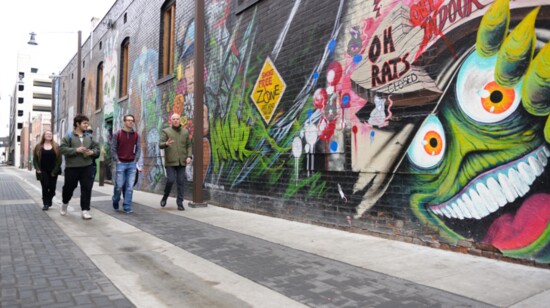A quote from Global Campaign for Education states, “Education is perhaps the most powerful tool for reducing poverty, improving health, promoting healthier economies, and providing peaceful and productive opportunities for young people around the world.”
In Idaho, the number of high school seniors who go on to college is one of the lowest in the nation. Each year, over 1,200 Idaho students who are admitted to U of I don’t enroll due to their financial situation.
Fortunately, the Vandal Promise program provides additional scholarship and grant support that enables financially challenged students go on to success in college and beyond.
The University of Idaho in Boise shares these same principles, with an added goal of increasing opportunities, degrees, and programs for local students without the added cost and travel to their main campus in Moscow.
Though the numbers of U of I Boise students are small in relation to the Moscow campus, the classes offered go beyond attending lectures in the traditional brick-and-mortar classroom. These programs often require students to venture deep into the community at large.
Says Chandra Ford, Chief Executive Officer, “Local access to U of I programs makes a difference. For example, the College of Art and Architecture offers this dual location program where you can spend up to two years in Boise and then move to Moscow to finish your undergraduate degree. It allows local students to pursue this degree and save up to $8,000 a year when they start here (Boise) and they make contacts locally to later get a job. The students appreciate the opportunity to start in Boise.”
This locally-grown outreach is best seen through the efforts of the College of Law. Boise-based students have sought opportunities for advocacy and pro-bono work. Most recently, they’ve tackled the growing housing crisis and its impact on renters, the fallout from an unprecedented two years of the pandemic.
Ford states, “The College of Law partnered with the Jesse Tree nonprofit for some housing issues and pro-bono legal work that directly affects the community.”
Marketing and Communications Manager, Maria Ortega, further explains the partnership with the Jesse Tree nonprofit: “The partnership started last year because with Covid and rising housing costs some people found themselves having trouble paying rent. Jesse Tree is the only nonprofit that provides payments to landlords to help people who cannot pay, and the College of Law students do the pro-bono work by being the negotiators. It’s a win-win because it allows landlords to get their money and the renters avoid eviction.”
By expanding these outreach efforts, students in other academic fields and programs were also able to make an impact by assisting in other ways that directly service Idaho and its surrounding towns and cities. This includes the Integrated Design Lab which works very closely with industry (Idaho Power) to help create sustainable, energy-efficient and safe buildings as well as research and design for making more efficient workspaces feasible.
Says Ortega, “We had a group of these students who went to the small Idaho town of Murtaugh and conducted an energy audit on their city hall and came up with ideas and suggestions on how to save money for local taxpayers by reducing their annual energy bills while maintaining comfort in the building.”
Another U of I Boise program serving our community is the Food Technology Center in Caldwell. “Our Food Technology Center has launched about every type of packaged food company in the valley over the years because it’s a huge commercial test kitchen and processing facility" adds Ford.
Says Ford, “The U of I’s current fundraising campaign raised a record-breaking amount of money in 2022. Much of the new funding from generous donors allowed us to increase the number of Vandal Promise scholarships. As one of America's best value universities, U of I prioritizes affordability.”
Though low graduation rates are alarming, the University of Idaho Boise sees a bright future for Idaho kids, especially by expanding scholarship opportunities and upping recruitment efforts. Keeping students immersed is the lifeblood of a local society and essential for growing a stronger community - a community that thrives and gives back tenfold.
Ford adds, “We are really very proud of how much we give back. And when we talk of giving back to the community, we have 21,000 alumni in the Treasure Valley and so many of those people are leaders who work in business, government, and non-profits and many get their degrees at the University of Idaho and move back to Boise.”
Says Ortega, “We help students here apply what they learn by interacting with and supporting the community where they are living. And that is a huge learning experience for students, maybe even more than what they learn in the classroom. We support organizations and efforts that contribute to the educational, economic, and community development in the region, we are engaged in fostering communities’ sustainability, growth, and educational access and we do this through teaching, research, and outreach.”
For more information about classes, degree programs, and community outreach, please visit the University of Idaho Boise webpage (uidaho.edu/boise).
